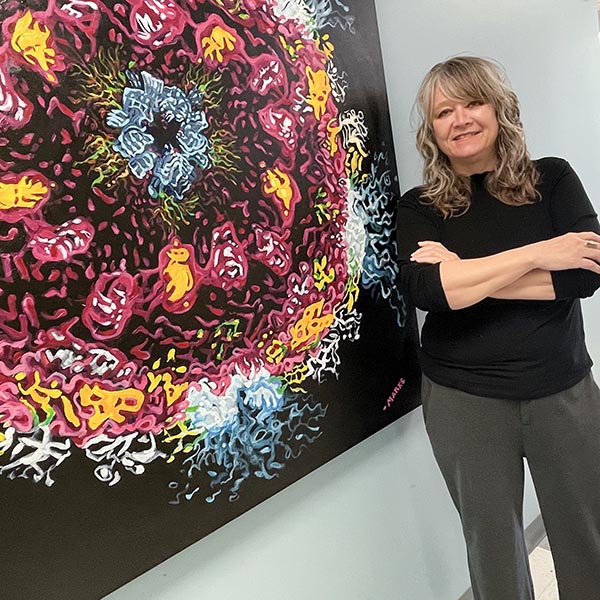
The diagnosis is devastating.
You have cancer. Common treatments are chemotherapy or radiation.
Yet there may be another option for you – one that Dr. Cathy Miller, chair and professor of veterinary microbiology and preventive medicine, and her research team in the College of Veterinary Medicine have been studying for over 20 years.
“The viruses we are working with are clinically benign, they don’t cause substantial disease in most people,” Miller says. “But they serve as an excellent model system for understanding more pathogenic viruses.”
Before Miller started on this research track, it was discovered that these viruses replicate and kill tumor cells while non-tumor cells can prevent this replication. Subsequent clinical trials showed that the virus can shrink tumors or prevent them from growing in many, but not all, cancer patients.
“This research has progressed to show that the virus is not just killing the tumor cells, but it is activating the immune response to begin attacking the tumors,” said Miller, whose lab has not been involved with any of the clinical research.
That’s where Miller and her lab come in.
She is interested in understanding how mammalian orthoreoviruses package their genome and whether additional information can be added to the virus genome to make it better at killing cancer.
“Because we now know that the viruses activate a general anti-tumor response, we wanted to determine if we could focus this immune response against specific tumors,” Miller said.
To accomplish this, Miller’s research team engineered a virus that expresses sequences that can induce an immune response against a tumor associated antigen protein which plays an important role in some subtypes of breast, bladder, and other cancers.
Miller has learned that a mammalian orthoreovirus can be created that expresses tumor associated antigens. But it’s not easy.
“We have a lot to learn even about producing the virus,” Miller said. “Our first-generation virus was found to replicate to high levels in tumor cells and induce cell death. However, the virus was not sufficiently stable.”
Miller’s team believes they have learned why this is happening and are currently working on a second-generation virus.
“Once we recover more stable viruses, we will then be able to test our hypothesis that they will specifically target tumors and generate an immune response against tumor cells overexpressing the tumor associated protein,” she said.
Even then questions remain.
“We do not fully understand why some types of cancer, or even different people with the same type of cancer, respond differently to mammalian orthoreovirus therapy,” Miller said. “We are trying to identify specific tumor environments that are amenable to or changed by mammalian orthoreovirus infection. We have shown that the virus is able to interfere with the cell response to stress in ways that may be beneficial from a cancer therapeutic standpoint.
“But that’s another story.”
November 2023
